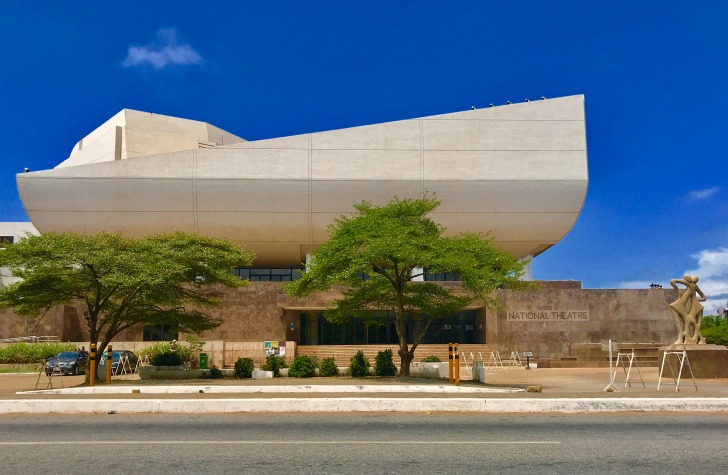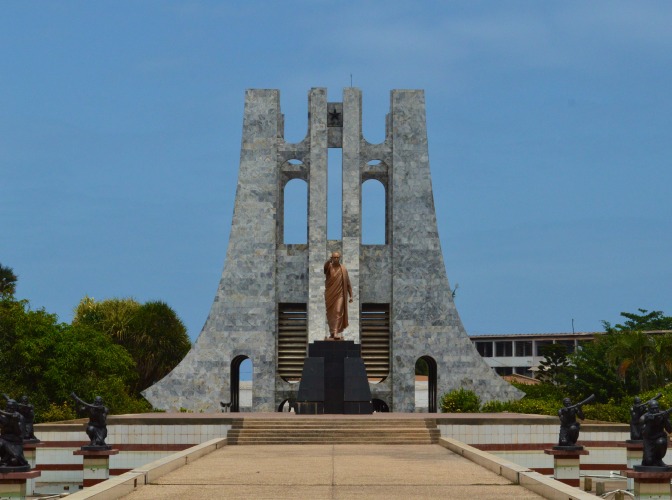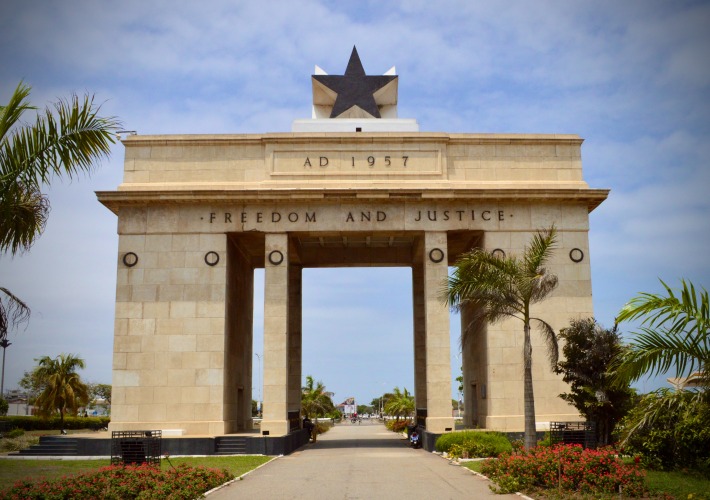Ghana is officially known as The Republic of Ghana.
It is a west African country that borders the Atlantic Ocean in the south and Togo in the west.
Burkino Faso is located to the north of Ghana and Côte d’Ivoire to the east.
The country is the largest gold producer in Africa and the second largest cocoa producer.
As of 2018, the population of Ghana was 29.6 million residents.
The country enjoyed rapid economic growth from 2017 to 2019 before Covid brought it to a halt.
It is viewed as one of the most peaceful countries in Africa.
But, is it worth moving to Ghana?

Contents
Pros of Living in Ghana
1. Cost of living
As of December 2022, the exchange rate between the US dollar and the Ghana Cedi was $1 to 8.34 GHS.
If you are earning dollars while living in Ghana, your money will go a long way.
Most people move to Ghana for work-related purposes.
Some remote workers and nomads choose to live there for the financial benefits and the beautiful natural landscape and scenery.
A family of four can live off approximately $1650 per month, without rent, and a single person can get by at just under $500, excluding rent.
To put it into perspective, a meal at an inexpensive restaurant may cost you less than $5, a domestic beer is 0.89c and an imported beer is around $1.50.
Monthly utilities will cost you under $400, all-inclusive, and local childcare works out to be approximately $80 a month, while international childcare is a steep $5,000.
The cost of living can be very low if you are earning foreign currency in Ghana.
2. Crime
Ghana is often referenced as the safest country in Africa.
And, according to a report, the overall crime rate is moderate to low.
For the most part, people are safe walking alone during the day and moderately safe walking alone at night.
There are moderate concerns about petty crimes such as pickpocketing.
However, while still a relatively safe country, there are incidents of violent crime such as car-jacking and street muggings, but these happen in isolated areas, and usually at night.
During 2021, there was a peak in criminal activity including the use of weapons.
The UK advisory board states that most visits are problem-free but that people who live in or visit Ghana should exercise reasonable caution whenever out and about, and should preferably do long-distance traveling during the day, and in convoy.
3. International Schooling
For ex-pat children who come from countries like the USA, UK, France, Canada, and Australia, there is an excellent selection of international schools that offer outstanding curriculums.
For children that have religious backgrounds and require schools that meet those needs or prefer Montessori schools, there is also a selection to choose from.
The options are also more varied in larger cities like Accra, the capital.
This type of education also comes with a hefty price tag.
For children who opt to attend public schools, the good news is that these schools are free for children aged between four and 15.
4. Mesmerizing beaches
Some of the most beautiful beaches in Africa can be found on the west coast.
The country boasts approximately 350 miles of beautiful white sandy beaches that are washed by waves from the Atlantic Ocean, and feature swaying palm trees.
Some beaches, like Ankobra Beach, located near the Ankobra River, are the perfect place to relax and unwind.
This beach features a forest with exotic birds that visitors can explore.
Labadi Beach is less relaxing and a little bit more exciting with locals entertaining visitors with performances.
You’ll often find travelers and locals surrounding a bonfire and enjoying themselves.
5. English is commonly spoken
English is widely spoken in the capital and larger cities.
Most students can study in their mother tongue for the first three years of school, after which instruction is conducted in English.
Communicating with locals shouldn’t be a problem, as most Ghanaians speak English.
The country has about 50 indigenous languages and English is the official language.
Akan is probably the most widely spoken indigenous language as approximately 44% of the population speaks this language and around ten million residents speak English.
This has been the official language of the country since it obtained independence from Britain in the 1950s.
6. Rich in history and culture
Ghana enjoys a rich and long history with its inhabitants dating back to 10,000 BC.
The country boasts beautiful sandy beaches, lush forests, and very diverse animal life, including some interesting exotic animals.
Previously a British colony, Ghana was the first African country to gain its independence in 1957.
7. Friendly people
There’s no doubt that this peaceful country is home to some of the most friendly and hospitable people on the planet.
Residents of Ghana are very proud of their heritage and love to share their history, heritage, food, and culture with those visiting.
It isn’t uncommon for total strangers to invite you into their homes to share a meal with them.
Be mindful of the customs and norms though, eating with your left hand is heavily frowned upon in Ghana.
It is considered to be rude table manners.
8. Exquisite natural sites
Ghana has some of the most beautiful and scenic landscapes and natural beauty you will find in all of Africa.
Some of the world’s most untouched beaches can be found in Ghana.
There are many waterfalls spread out across the country. Some are popular and visited by many who frequent the country, while others are only known to locals.
For travelers who like to hike or ex-pats that enjoy the outdoors, the country features many scenic vistas, almost too many to mention.
Volta Lake, the largest man-made lake, can be found in Ghana.
Many scenic and cultural destinations feature prominent rivers and lakes around the country.

Cons of Living in Ghana
1. Transportation
Ghana uses the road, rail, air, and water to transport passengers around the cities and the country.
The most prominent form of transportation is the informal mini-bus system.
Around 70% of the population makes use of this mode of transportation because it is flexible and affordable.
These mini-busses, also called Tro tro’s, are often filled past capacity, and more often than not, these mini-busses are older, and not as well maintained, which is a cause for concern regarding the safety of the passenger.
However, if you earn dollars or own a vehicle, it should not affect you.
2. Crime against women
Although abolished, Female Genitalia Mutilation (FGM) is still a concern in Ghana.
This practice is deeply rooted in social norms which stem from gender inequality.
In addition, due to cultural norms, violence against women and girls is socially acceptable and women are considered inferior to men.
The sad statistic is that 94% of children between the ages of one to 14 will have experienced gender-based violence.
3. Culture shock
Many people experience culture shock when moving to Ghana.
This is something that many ex-pats face when they move to another country.
In terms of traditional Ghanaian cuisine, starch is served with a stew or soup in a communal dish.
Friends and family gather around and eat with their hands. It is considered very rude to eat with your left hand.
You should only eat with your right hand. Two bowls are placed on the table for each guest.
One is to wash your hands before eating and another is to wash your hands after eating.
The thumb, index, and middle finger are used to collect food from the communal dish.
Visitors and ex-pats who are not accustomed to this style of dining may experience culture shock.
Bargaining is standard practice in Ghana.
It is considered to be a cultural institution.
There is deep meaning rooted in the practice.
The seller starts by announcing the price before the buyer makes a remark and counters the offer.
This continues until a price is reached.
Visitors and ex-pats who are not accustomed to this practice may experience culture shock.
4. High unemployment and poverty
The country experiences high levels of poverty and high levels of unemployment, especially among the youth.
Ghana saw rapid economic growth between 2017 and 2019 before the pandemic hit.
During the pandemic, economic growth was brought to a standstill.
Approximately 50% of the youth are unemployed and, due to a sluggish economy, prospects currently seem low for this to change.
The unemployment rate in Ghana is above the world’s unemployment rate. As of 2020,
Ghana had an unemployment rate of 4.65%.
The result of this is that you’ll find low-quality housing around the country, underfunded public schools, limited recreational activities, and an overall sense of gloom.
5. Corruption
Ghana was rated 73rd for corruption, compared to 180 other countries, according to the Corruption Perceptions Index in 2021.
Corruption seems to be a significant challenge faced in this country.
It is much more prevalent in the public sector than in the private sector.
The sectors that are most affected include the natural resources sector, politics, and the police.
It is estimated that the country loses billions as a result of widespread corruption.
6. Health concerns
The country faces health concerns that include HIV/Aids and Malaria.
According to the CDC, Ghana is making significant strides in addressing these concerns.
Malaria is a pandemic that is constantly present in all areas of Ghana.
7. Support system for special-needs kids
Some public schools do not have adequate support for children with disabilities.
Many international schools have put measures in place to accommodate children with special needs, but the school will need to be contacted to determine the type of measures that have been implemented.
8. Traffic
Due to rapid population growth, migration into major cities, and more and more Ghanianians being able to afford private transportation, congestion is a significant problem in cities.
The problem lies in the fact that urban planning has not been updated.
The congestion causes many other problems such as road accidents and pollution.
Pros and Cons of Living in Ghana – Summary Table
| Pros of Living in Ghana | Cons of Living in Ghana |
|---|---|
| 1. Cost of living | 1. Transportation |
| 2. Crime | 2. Crime against women |
| 3. International Schooling | 3. Culture shock |
| 4. Mesmerizing beaches | 4. High unemployment and poverty |
| 5. English is commonly spoken | 5. Corruption |
| 6. Rich in history and culture | 6. Health concerns |
| 7. Friendly people | 7. Support system for special-needs kids |
| 8. Exquisite natural sites | 8. Traffic |
Ghana Safety Overview
READ THE FULL REPORT: Ghana Safety Review
Safety Index:
- OVERALL RISK: LOW
- TRANSPORT & TAXIS RISK: MEDIUM
- PICKPOCKETS RISK: MEDIUM
- NATURAL DISASTERS RISK: LOW
- MUGGING RISK: LOW
- TERRORISM RISK: LOW
- SCAMS RISK: MEDIUM
- WOMEN TRAVELERS RISK: MEDIUM
Frequently Asked Questions
What is the national dish in Ghana?
A starchy dish served with all main courses called Fufu.
How long can I live in Ghana?
Visitors can stay for up to three months.
Do people speak French in Ghana?
Yes, it is one of the spoken languages.
Are there lions and tigers roaming the streets in Ghana?
No.
This is a myth, as lions are rarely found in the wild in Ghana.
What is the most visited tourist attraction in Ghana?
The Cape Coast castle and Elmina castle.












I am considering moving abroad and this was a good start for initial info on Ghana. I found it quite useful as a starting point.
I want my family to relocate to Ghana I think is a good idea
you better stay where you are or better still move to a better country. i am in Ghana and trust me, no youth in Ghana wants to stay anymore.
Haha. These are lies. There are con men and woman there Nope it is NOT safe. The medical care is horrible. The food is disgusting.
NO. My brother retired there. No good medical care. He got Malaria and the hospitals killed him. The people are con artists. Not all but they prey on foreigners It’s corrupt
Taking a solo trip to Ghana in November. This information was very helpful.
This information is very much interesting to me. The information is interesting in that it disclose the high level of safety, education and healthcare in Ghana with friendly locals/residents.
I’m a Liberian wanting to relocate my family to Ghana in the nearby future.
I just got back from Ghana again.
I’m moving over there in a few months 🤞🏽
I’ve been visiting for several years in considering moving over. This article is spot on for all comparisons that I agree with, except cost of living. While it can be an advantage in comparing the poor, the average working class cost is far more than lead to believe. Rent (which is inaccurately reported everywhere I saw) is the leading cost of this followed by food if you are not accustomed to the local market shopping for local dishes. So, as a westerner, minus the accomodations and home foods it’s a very inexpensive and affordable place to live
Be careful of the scammers and there are plenty. They will rob you blind. Plus malaria is epidemic. Horrible horrible place. It’s ok to visit but if you settle there you are doomed.
I intend to relocate to Ghana from Nigeria, I hope it’s a good start for me
It’s a horrible hell hole. If you get sick there then you are out of luck. The hospitals there will kill you
Ghana is a hell hole.
also planning to spend my retired life there ill have about 1300 usd a month in pension and renting a small place 3 rooms are about 400 usd food s cheap my only fear is if i get sick
my fear exactly.. exactly. the only thing keeping me away from going right now. My husband who is from there says that there are good health care but you would have to pay cost to USA medical fees.